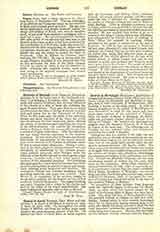

Conrad of Hochstadt (HOSTADEN), Archbishop of Cologne and Imperial Elector (1238-1261), and son of Count Lothar of Hochstadt and Mathilde of Vianden, date of birth unknown; d. September 28, 1261. Nothing is known of his early youth. In 1216 he became beneficiary of the parish of Wevelinghoven near Dusseldorf; in 1226 he was canon and, some years later, provost of the cathedral of Cologne. After the death of Henry of Molenark (March 26, 1238) the cathedral chapter elected Conrad Archbishop of Cologne. He received the archiepiscopal insignia from the Emperor Frederic II at Brescia in August of the same year. The following year, October 28, he was ordained priest and consecrated archbishop by Ludolf of Munster.
During the first few months of his reign the new archbishop was on the side of the emperor in his conflict with Pope Gregory IX, but for unknown reasons went over to the papal party shortly after the emperor’s excommunication (March 12, 1239). The whole temporal administration of Conrad was a series of struggles with some neighboring princes and with the citizens of Cologne, who refused to acknowledge the temporal sovereignty of the archbishop over their city. Conrad was generally victorious, but his often treacherous manner of warfare has left many dark spots on his reputation. When Pope Innocent IV deposed Frederic II (July 17, 1245), it was chiefly due to the influence of Conrad that the pope’s candidate, Henry Raspe, Landgrave of Thuringia, was elected king, and when Henry died after a short reign of seven months (February 17, 1247), it was again the influence of Conrad that placed the crown on the head of the youthful William of Holland.
In recognition of these services, Pope Innocent made him Apostolic legate in Germany (March 14, 1249), an office which had become vacant by the death of Archbishop Sifrit of Mainz, five days previously. The clergy and laity of Mainz desired to have the powerful Conrad of Cologne as their new archbishop. Conrad seems to have secretly encouraged them, but for diplomatic reasons referred them to the pope, who kindly but firmly refused to place the two most important ecclesiastical provinces of Germany under the power of one man. Shortly after this decision the hitherto friendly relations between Pope Innocent IV and the archbishop ceased, and in April, 1250, the Apostolic legation in Germany was committed to Peter, Bishop of Albano. At the same time began Conrad’s estrangement from King William, which finally led to open rebellion. With all the means of a powerful and unscrupulous prince, Conrad attempted to dethrone William and would probably have been successful had not the king’s premature death made the intrigues of the archbishop unnecessary. After the death of King William (January 28, 1256), Conrad played an important but despicable role in the election of the new king. For a large sum he sold his vote to Richard of Cornwall, brother of Henry III of England, and crowned him at Aachen, May 17, 1257. This was the last important act of Conrad. He is buried in the cathedral of Cologne, of which he laid the cornerstone, August 15, 1248.
MICHAEL OTT

